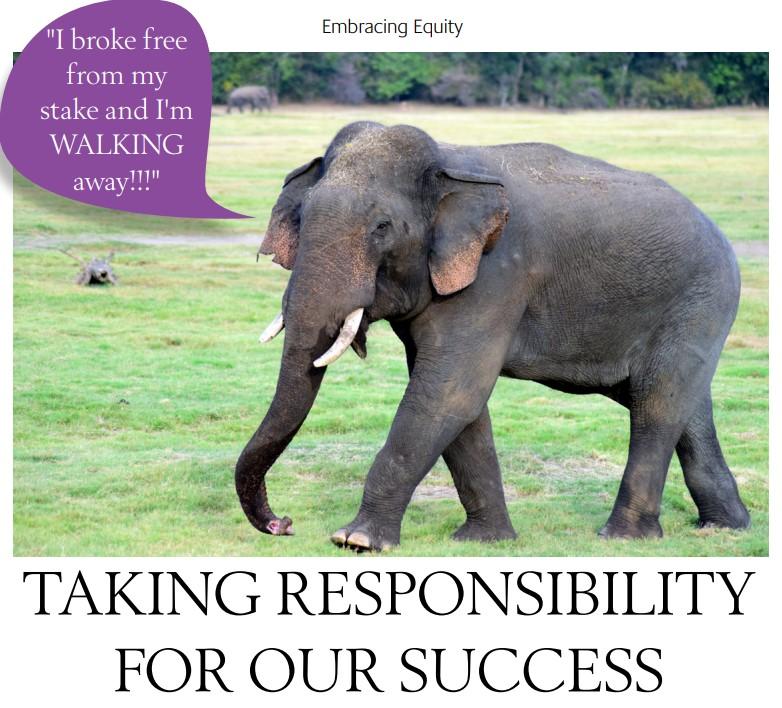Taking Responsibility For Our Success
By Sharon Christopher
CEO - Sharon Christopher and Associates

LINKAGE Q1 (2023) - Woman's Leadership: Embrace Equity
M
uch of the discussion on the theme of this year’s International Women’s Day (Embrace Equity) centered around what others had to do to enable women to live their best lives. However, my own experience has shown that it is also important for each woman to take responsibility for achieving her success.
We are often told that to achieve success there are things that we need to acquire. For example, having the correct academic qualifications. And very often the expectation is that having acquired these things, our success is guaranteed once others do their part. I have learned that while the acquisition of some things is important, true success in large part depends on our ability to let go. I set out below some of the most important things that one must let go of to move forward.
Negative Conditioning
When it was still appropriate to have animals in a circus you would see elephants with a rope around their leg that was attached to a stake in the ground. The adult elephant did not move, even though with the least bit of effort the elephant could pull the stake out of the ground. The reason for this was, when the elephant was small, it was tied to the stake like this, and it could not move. By the time it was large enough to remove the stake, it was already conditioned to believe that it could not break free, so it did not try. This is how negative conditioning works. As a result of what we have experienced in our lives, we may be conditioned to believe that we cannot break free of the stakes. What is even more damaging is that often we do not realise that we are being held back by these stakes.
For example, a child who has not passed the Secondary Entrance Examination for a “prestige school” may receive the message that she is limited intellectually. As an adult, she may invest heavily in making sure that she is highly qualified academically. Eventually, she enters the work environment, and she may do quite well in the technical aspects of her job, yet she finds herself “struck dumb” in meetings, unable to ask questions outside of her area of expertise, even though she has an opinion on the matter. Similarly, she is unable to defend her position before persons she considers to be “brighter” than her because they went to the “right” schools. This behaviour then adversely affects how the woman is viewed in terms of the value that she brings to the organisation.
It is important therefore for us all to be conscious about how we have been negatively conditioned. To do this, it helps to consider your life in five-year blocks. As you consider each five-year period, consider the messages you received that are negatively impacting you today. Then take action. This can range from developing your own strategies, to seeking professional help from persons such as a coach or a psychologist.
Fear
Fear is one of the most paralysing of emotions. Yet if you have no fear, you are not likely to live very long, or to live a life without suffering serious physical injury. However, what a woman fears is that, in spite of her achievements, she is just not good enough. This fear may stop a woman from accepting jobs outside of her comfort zone, even though to accept such a job can be a career builder. It is important therefore to learn to move ahead despite the feeling of fear.
When I was a young government lawyer, I was requested to work on the international finance desk. This meant that I had to travel with the technocrats in the Ministry of Finance to the major international financial markets to negotiate multi-million dollar loans. I was terrified and did not want to take on the assignment. The Attorney General at that time had little sympathy, saying to me “You are a lawyer, aren’t you?” So off I went, eventually becoming somewhat of an expert in this area. It would have been easy to just refuse to do it, but having to face that fear and do it nonetheless allowed me to acquire an expertise that served me well throughout my career.
Anger and Resentment
A woman may have a very bad experience; for example, she may have been wrongfully denied a promotion or she may be sexually harassed at work, and she carries that anger and resentment within her and it spews out in her daily interactions. And despite the quality of her work output, no one wants to work with her. So, her behaviour becomes a barrier to her success.
To overcome anger and resentment, one needs to learn to forgive. Forgiveness does not mean that you must forget what happened, or that you have to continue the relationship with anyone, or stay in a particular job. It means that you must stop using the excuse of what happened to you as a justification for your behaviour. It means freeing yourself so that you can live your best life. One of the ways to get to a place of forgiveness is to focus on what is good in your life. A great exercise to do is to write down three things every day that you are grateful for. You cannot repeat anything previously written. You will find that after the fourth day, you will have to actively look for things to be grateful for. Focusing on gratitude helps to dissolve the anger and resentment.
Doubt
In certain circumstances, the challenges we face may seem insurmountable. In those times, we do not go after our dreams, or we do not move beyond current situations because we simply cannot see how it is possible for us to overcome that situation. One of the simplest strategies to use when doubt threatens to overwhelm you is the constant repetition of positive affirmations.
2014 was the worst year of my professional life. My organisation was embroiled in a debacle related to an issue of shares. It seemed that I would be made the scapegoat for this, although I was innocent of all the allegations being made. I believed that it was the intention of the Board to fire me. I felt that my reputation was being destroyed. They were several things that I had to do to get myself through the situation, but in many ways one of the easiest, and dare I say, most effective was my constant repetition of positive affirmations. These included: “No weapons formed against me shall prosper; If God be for me who shall be against me; All is well, everything is working out for my highest good, out of this situation only good will come. I am safe.” By the end of that year, the situation had been resolved and, though somewhat battered and bruised, I had survived. The thing about positive affirmations is that their constant repetition can bring you to a place in which you begin to believe that what you are repeating will become your truth. One of the affirmations that every woman should repeat until it is stuck in her subconscious is “I am worthy. I am enough”.
The journey towards true success is not necessarily an easy one. Yet each of us has the power within us to let go of the chains that bind us, and as we do this, we will move into the life that we deserve. Use that power!
ABOUT THE AUTHOR

Sharon Christopher is the CEO at Sharon Christopher and Associates.